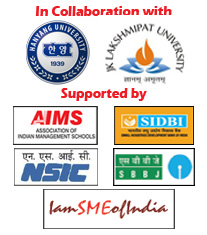About the Conference
The current global environment describes intense competition and
dynamic changes in the business world. Understanding the nature of global
trends with context to development of small and medium enterprises in the
global economy has never been more important than now. As a driving force for
innovation, employment and economic development, micro, small and
medium–sized enterprises (MSMEs) play an important role in a country’s
economy. Financing has been a problem for MSMEs for a long time, which
restrains their growth and development. As the gap in access and use of financial
services and products by MSMEs still remains a challenge, there is an urgent
need to critically review the various existing parameters, efficacy of existing
institutional arrangements and systems from different perspectives.
During the last decade or so, India has recognized the role and importance
of what was earlier termed, cottage industries or ‘tiny’ or small scale industries,
or ‘the informal sector’ enterprises. These were seen mainly as employment
creating or capital saving sectors and, therefore, requiring special place in the
planned program for industrialization. Today most observers have recognized
that not only in India but also in the developed world the SMEs play an
important part in creating output, employment and exports. In India itself the
number of SMEs is estimated as about 20 million enterprises. They account for
45% of industrial output, 40% of exports and employ 60 million workers. The
range of the products produced in the sector is vast. UNIDO has listed about 400
SME clusters in the country. The list excludes the SMEs in the service industries
such as tourism, healthcare, education etc. The international institutions such as
the Europe–India Business Council and the Indo–US Chamber of Commerce
are also providing platforms for the SMEs.
In view of the growing importance of this sector, the Conference has been
planned to provide a forum for sharing knowledge and information to form the
basis for discussion and policy making. One of the important aspects is that
management education so far has addressed issues relating mainly to the
corporate world. The SME sector is dominated by non–corporate entities in
which the organizational structures do not fit easily into familiar categories.
They have enormous opportunities for growth, both internally and globally. The
challenges being faced by them and their concerns, therefore, need to be looked
at in different viewpoints. The sub–themes in the Conference have been
identified taking into consideration the technology and institution related issues
of finance, marketing, entrepreneurship, technology and upgrading skills of
workers and managers. This has been done in the hope that management education and training would be able to provide fresh thinking to deal with SME
related issues.
The conference is being organized jointly by the Poornima School of
Management, Poornima Group of Colleges and the Poornima University, Jaipur
in collaboration with Hanyang University Business School, Seoul, South
Korea and JK Lakshmipat University, Jaipur.
Main objectives of this conference
- to bring academicians, researchers and others from the international and national community on a common platform to explore and examine the diverse facets of current status of small and medium enterprises and to offer implementable managerial inputs across management disciplines and various sub–themes there under;
- to bridge the gap between industry and academia and develop an understanding of the opportunities and challenges being faced by MSMEs in the global context and find appropriate solutions; and
- to expose the young students of management, who are the potential leaders of the future, to ideas and practices that will equip them with relevant background to meet the emerging trends across the globe.
